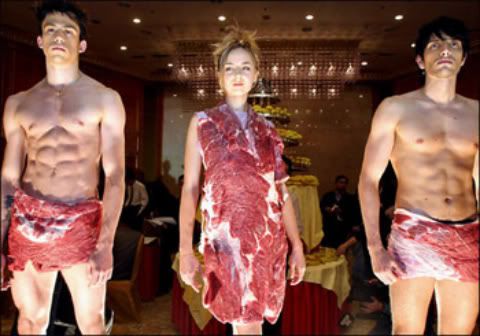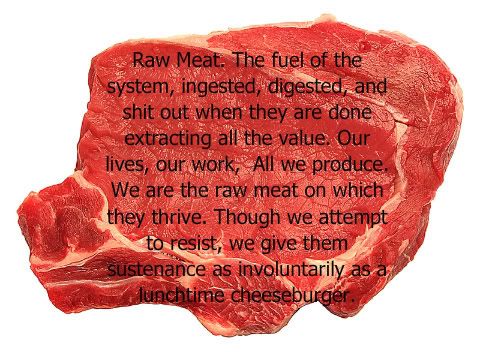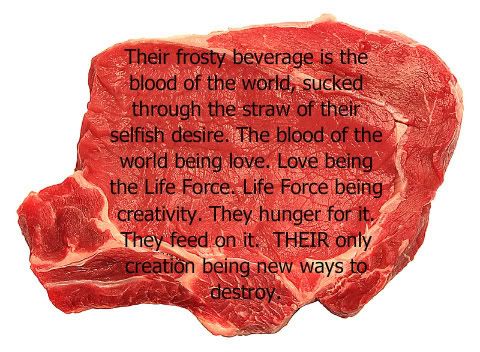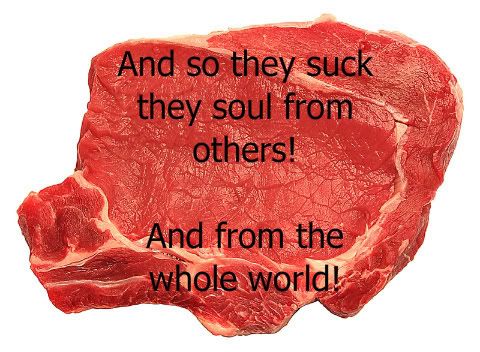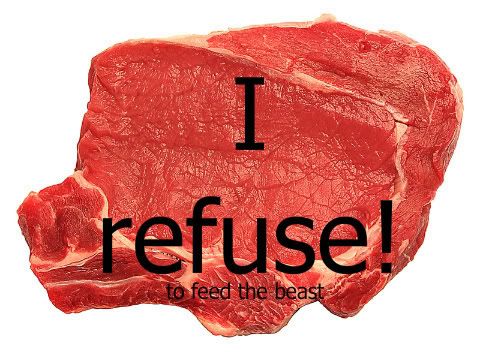Every few days over the next several months I will be posting installments of a novel about life, death, war and politics in America since 9/11. Through the Darkest of Nights is a story of hope, reflection, determination, and redemption. It is a testament to the progressive values we all believe in, have always defended, and always will defend no matter how long this darkness lasts. But most of all, it is a search for identity and meaning in an empty world.
Naked and alone we came into exile. In her dark womb, we did not know our mother’s face; from the prison of her flesh have we come into the unspeakable and incommunicable prison of this earth. Which of us has known his brother? Which of us has looked into his father’s heart? Which of us has not remained prison-pent? Which of us is not forever a stranger and alone? ~Thomas Wolfe
All installments are available for reading here on Docudharma’s Series page, and also here on Docudharma’s Fiction Page, where refuge from politicians, blogging overload, and one BushCo outrage after another can always be found.
Through the Darkest of Nights
Highway 8
In the watches of the night, as darkness deepened across the Middle East, new orders from CENTCOM in Qatar passed down the chain of command, from a man with four little stars on his collar to men with fewer little stars on their collars, who passed them on to men with little eagles, little oak leaves, and little bars on their collars. When the orders reached the men at the bottom of the chain who do the killing, the order process was complete and the killing process got underway.
That process began as the darkness receded and dawn broke over the Tigris-Euphrates Valley, revealing an armored column of M1A1 Abrams tanks, M2 Bradleys, and support and command vehicles stretching for more than a kilometer along Highway 8. In the middle of this column, a man with one little bar on his collar stood in the commander’s hatch of his tank, knowing that if the killing proceeded smoothly today, knowing that if he did his share of it with efficiency, his accomplishments would be acknowledged and he would soon get to wear two little bars on his collar.
Determined to earn that promotion, 2nd Lieutenant Travis Wharton scanned the northern horizon through his field glasses, but Baghdad still lay hidden from sight in the morning haze. So be it, he would see the Iraqi capital soon enough. He was ready, confident that his years of experience and training would serve him well today, but he had less confidence in his gunner, loader, and driver. They were exhausted. Everyone in the entire 3rd ID was exhausted.
It was quiet down in the turret. Too quiet.
His gunner, loader, and driver were good soldiers, but they were even better talkers. They’d fought and talked their way through the past three weeks, all the way up from Kuwait, through the long hours across the empty desert, through the sandstorms, through the firefights as the 3rd ID charged north towards Baghdad, past Nasiriyah, and then Samawah, and then Najaf and Hillah and on through the Karbala Gap. His driver, Sergeant Hewitt, even talked in his sleep.
But they weren’t talking now. None of the 975 soldiers in the 1st Company of the 64th Regiment of the 3rd ID had much to say this morning.
Travis loaded the M2 machinegun mounted on the ring of the commander’s hatch and was about to start loading the M240 mounted on the loader’s hatch ring when Sergeant Mason Chiles popped up through the loader’s hatch, glanced at him, loaded the M240, and reached for his helmet lying beside it. “I can’t believe these orders, sir.”
“You don’t need to believe them, Sergeant Chiles, all you need to do is shoot at the hajjis who are shooting at you.”
“I’ll do that. But sir . . . we’re going into Baghdad, into an enemy city of five million people, with only 30 tanks, 14 Bradleys, a few M-113’s, and some Humvees . . . that just doesn’t make a whole lot of sense to me.”
“It’s called a Thunder Run.”
“Well I can think of a few other names for it.”
“Think of armed recon. You’ve heard of armed recon, sergeant?”
“Yes, sir.
“That’s all this is. We’re going to conduct an armed recon up Highway 8 into the southwest edge of Baghdad, see what kind of resistance we stir up, and then hang a left and head to the airport. If that’s OK with you.”
Chiles pulled his helmet on. “Yeah. It’s just fine and dandy with me.”
“Good. Let’s get this over with.”
“Yes, sir. ”
Travis saw the tanks at the head of the column start to move and felt the adrenaline rush he always felt when battle was imminent. When the Bradley ahead of them rumbled forward, Sergeant Hewitt gunned the Abrams’ big gas turbine engine, the 60 ton tank’s steel tracks started turning, and they were northbound for Baghdad.
As the armored column headed north in the early morning haze through the outskirts of the sprawling Iraqi capital, Travis waited for the first reports of contact to come over the radio net. Iraqi’s were watching them from buildings and warehouse complexes lining both sides of the highway; most were in civilian clothes and waved, apparently thinking they were seeing a Republican Guard column, but others were wearing black uniforms and had AK-47’s and grenade launchers.
“Fedayeen.” Travis trained his M2 on the distant figures just as an RPG streaked towards the Abrams at the head of the column. It missed, but heavy fire from both sides of the highway began to rake the leading tanks. In response, bursts of machinegun fire ripped through the morning air from the leading Abrams and Bradleys, then intensified into a steady barrage.
As the middle of the column came under fire, Travis fired a burst at several Iraqis shooting at them from a warehouse roof. The heavy fifty caliber rounds tore one of them apart and the others dropped out of sight. Chiles fired his M240 at black-clad men on an overpass training the barrel of an anti-aircraft gun down on the column. The shells tore chunks of concrete from the facing of the overpass, cut down three of them, and the rest scattered.
But thousands of armed men were rushing into the area aboard trucks, buses, cars, and APC’s, dismounting, and firing at the column from every direction.
“This is not looking good, Sergeant Chiles . . . ”
“Not exactly, sir.”
Travis trained the turret’s 120mm main gun barrel towards an armored personnel carrier racing towards them down an off ramp. A concussion blast rippled past them as the Abrams behind them fired a main gun round at the APC, detonating the fuel tank and turning it into a blazing wreck. The Bradley ahead of them fired a burst of 25mm chain gun rounds at a blue Datsun filled with militia firing AK-47’s, shattering the windshield and decapitating the driver. It careened out of control, smashed head on into the median, cart-wheeled over it, and landed upside down on the northbound lanes, crushing everyone inside.
An RPG hit the tank behind them, ricocheted off the thick armor plate and spun wildly through the air before exploding over the southbound lanes. Travis ducked down into the turret, grabbed two ammo cases, tossed them up through the commander’s hatch, and turned to Sergeant Hewitt. “No matter what happens, keep going. If we stop, we’re dead.”
“Shit, sir, we’re going to be dead no matter what we do.”
“Well then keep going until we’re dead.”
“Yes, sir.”
Travis climbed back up through the commander’s hatch, reloaded his M2, and looked up just as three RPG’s streaked towards the lead tank. Two of them exploded against the side of the turret, setting a can of fuel ablaze in the cargo rack. Trailing a swirling cloud of acrid smoke, the Abrams rolled to a halt, forcing the tanks and Bradleys behind it to brake to a halt, forcing the whole column to stop.
A hundred meters beyond the burning Abrams, a semi-trailer truck and two buses pulled onto the highway in front of an overpass, blocking both northbound lanes. Fedayeen scrambled from the buses, took cover in trenches dug into the overpass embankment, and raked the head of the column with machinegun fire. Up on the overpass, more fedayeen appeared, armed with grenade launchers.
As their chances of making it to the airport faded and the fighting intensified, Travis lost all sense of time. The muggy heat, the swirling smoke from burning vehicles, the smell of cordite hanging in the air, and the fear of being overrun assaulted his senses and rendered time meaningless. He swiveled his M2 at a squad of militia with grenade launchers on the roof of a mosque and fired a burst, killing three of them, then fired at another squad on the roof of the warehouse just north of it. Wounded, one of the Iraqis tumbled from the roof onto the asphalt below, picked himself up, staggered into the warehouse, and reappeared in the doorway with a grenade launcher.
Travis cut him down with another burst of 12.7 mm rounds but he’d already fired, the RPG slammed into the Bradley ahead of them and exploded. He didn’t see Sergeant Chiles duck down into the turret and grab an M-16, but he saw him pop back up through the loader’s hatch, take his bayonet from its sheath on his belt, attach it to the barrel, and set the M-16 down on the grimy turret top beside him. He saw him take his service pistol from its holster, slam an ammo clip into it, and set it beside the M-16.
“What are you doing, Chiles?”
“What does it look like I’m doing? I’m getting ready to die, if that’s OK with you. I was in Mogadishu, I know a clusterfuck when I see one, and I’m seeing one now. This Thunder Run is a clusterfuck, this war is a clusterfuck, this occupation is going to be the biggest clusterfuck America’s ever seen.”
“You’re tired, Sergeant Chiles. You’re exhausted. You’re not saying that, exhaustion is saying it.”
“No. Reality is saying it. Reality is staring us in the face, it’s talking to us, and we’d better start listening to it.”

